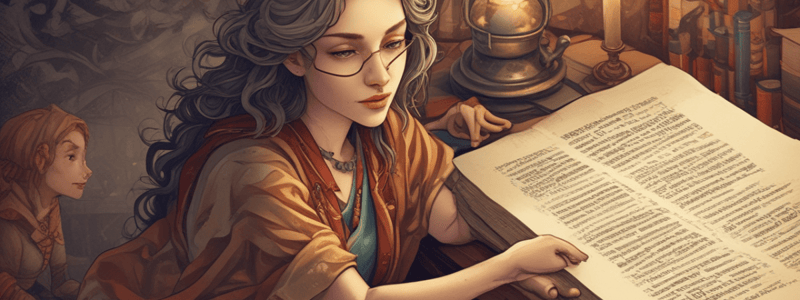Podcast
Questions and Answers
What is diction in writing?
What is diction in writing?
- The tone of a written work
- The way a writer structures their sentences
- The way a writer conveys emotions
- The writer's choice of specific words (correct)
What is the connection between words and their emotional impact called?
What is the connection between words and their emotional impact called?
- Syntax
- Imagery
- Denotation
- Connotation (correct)
What is the relationship between diction and tone?
What is the relationship between diction and tone?
- Diction and tone are mutually exclusive
- Diction has no impact on tone
- Diction determines the tone of a work
- Diction can greatly impact the overall tone (correct)
What is an example of a literary work that demonstrates colloquial diction?
What is an example of a literary work that demonstrates colloquial diction?
What is a characteristic of formal diction?
What is a characteristic of formal diction?
What is the primary purpose of diction in writing?
What is the primary purpose of diction in writing?
Which type of diction uses informal language specific to a particular region or area?
Which type of diction uses informal language specific to a particular region or area?
What is the result of combining different types of diction in a work?
What is the result of combining different types of diction in a work?
How does diction affect point-of-view in writing?
How does diction affect point-of-view in writing?
What is the primary difference between formal and informal diction?
What is the primary difference between formal and informal diction?
What is the primary way to establish point-of-view in writing?
What is the primary way to establish point-of-view in writing?
Which type of point-of-view uses the personal pronoun 'you'?
Which type of point-of-view uses the personal pronoun 'you'?
What is the effect of using informal diction in first-person point-of-view?
What is the effect of using informal diction in first-person point-of-view?
What is the purpose of using good tone words in writing?
What is the purpose of using good tone words in writing?
Why is it important to use homophones correctly in writing?
Why is it important to use homophones correctly in writing?
Study Notes
Diction in Writing
- Diction refers to a writer's word choices, which can affect how a reader feels about something or imagines the scene.
- Connotation is the connection between how a word makes a person feel and how they connect it to other words.
Types of Diction
- Formal diction: uses proper grammar and sentence structure, as well as professional and sophisticated language.
- Example: "As per our arrangement, the panel will convene at twelve o'clock."
- Informal diction: conversational, realistic, and focuses less on proper language.
- Example: "Let's grab a bite to eat sometime."
- Colloquial diction: uses informal language specific to a particular area or region.
- Example: "How are y'all doing today?"
- Slang diction: uses informal language created by a specific group or for a specific context.
- Example: "Spill the tea" to ask someone to explain something dramatic.
- Pedantic diction: implements academic writing, using formal and advanced academic language.
- Example: "The class fell under the tutelage of a new instructor who was fond of erudite discussions."
- Abstract diction: aims to express ideas or emotions.
- Example: "A storm of ideas" inside one's head to illustrate feeling inspired.
- Concrete diction: expresses ideas that are not open for interpretation, using specific and detailed language.
- Example: "My office is the third blue door on the right-hand side."
- Poetic diction: uses lyrical words, often descriptive and following rhythm or meter.
- Example: "There we go / Dancing nice and slow."
Tone and Diction
- Diction can showcase different tones, such as happiness, sadness, anger, and nervousness.
- Tone demonstrates the author's attitude or feelings toward a particular topic.
- Adjectives can be used to add tone to a sentence, making the author or character appear to feel a certain way.
- Examples of good tone words:
- Happy: cheery, ecstatic, elated
- Sad: dreary, mournful, despondent
- Angry: absurd, scathing, outraged
- Desperate: hopeless, forlorn
Point-of-View and Diction
- Point-of-view is the narrator's position within the story, established through personal pronouns and diction.
- Types of point-of-view:
- First-person: told from the viewpoint of a character in the story, using "I" and personal pronouns.
- Second-person: told from a character talking directly to the reader, using "you" and personal pronouns.
- Third-person: told from the viewpoint of a narrator, using "he" or "she" and personal pronouns.
Examples of Using Diction for Point-of-View
- First-person: "I am a doctor. It is the best job I have ever had."
- Second-person: "You are a doctor. It is the best job you have ever had."
- Third-person: "She is a doctor. It is the best job she has ever had."
How to Improve Diction
- Eliminate confusing words like homophones.
- Use interesting words.
- Use good tone words.
- Use words that are specific and descriptive.
- Examples of improving diction:
- Using "furious" instead of "very angry".
- Using "leaves rustled in the wind and fell softly to the ground" instead of "the air is windy".
- Using "Denny loved funny stand-up jokes" instead of "Denny loved certain funny jokes".
Studying That Suits You
Use AI to generate personalized quizzes and flashcards to suit your learning preferences.
Description
Learn about the importance of diction in writing and how it affects the reader's emotions and imagination. Discover how word choice influences tone and connotation in written works.




